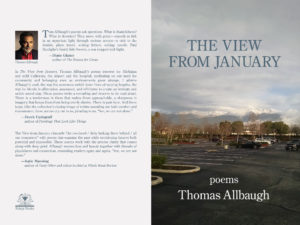I think I said this before, or something like it: Poets don’t write with the intention of making their poems hard to understand. They do not write in code that only English majors can break. Usually, they try to render experiences in the best terms. The mystery seems to enter with the terms, the language.
“The Seeds of St. Paul,” the final poem in my chapbook released just before the pandemic hit us this year, might seem like a typical example. Meaning might seem hidden, but it really is a poem about a bird that entered my wife’s string class a couple of years ago, after we’d lost Michael. She was busy tuning the cello that Michael had once helped her to fix shortly before he died, and the bird was chirping at her and demanding her attention. Even a colleague with her at the time said, “It looks like somebody wants your attention.”
In the evening after it happened, when she told me about it, she seemed to focus on the weirdness of the bird chirping at her. Weirdness didn’t cut it, though. There was something just out of reach of the words and the actual happenings that seemed to be speaking to her–it seemed to be about more than just what had happened.
I decided I had to get this experience down, and I started with the simplest form I could, free verse.
When I shared her experience with my friends who are also suicide survivors, they were impressed that more was going on with it than just a bird that she helped onto her hand and walked out of her classroom, only to have it return two more times. They felt something like wonder.
We share these semi-mythical images of birds and special people–St. Francis of Assisi, Snow White. Maybe, thanks to Disney, they are stereotypes at this point. But yes, my wife loves birds. When we were in Hawaii two summers ago, she stood and fed a flock of wild birds. But this isn’t just that. And I can’t say that I can pin just one meaning to my wife’s experience or to the poem I wrote. But it got me thinking about the failure of most of our words when we converse. These are the same words that people use to try to help the grieving by focusing their attention on some aspect of an afterlife we can only vaguely point at, though we act like it is concrete, as simple as figuring out a local bus line that will take us downtown.
Imaginations fail. Whenever someone tells me that Michael is in heaven now, my well intended friends seem to want me to take them literally. But how is this so? What is the calculus of this? What can lead to this happening? Because of the way my mind works, I’m left with with so many unknowable steps that I fall silent.
So a first line for the poem came to me, that perhaps St. Paul, in explaining the idea of the seeds of our heavenly bodies, was seizing on a metaphor. Perhaps that is what most of our ideas amount to that are about something we can’t know except through intimation or hope: We draw on metaphor to help us. This is, of course, an area that overlaps with poetry, and it doesn’t make the attempts to write about the experiences any less real.
I left it at this, wrote several versions of the poem and settled for the one that is in the chapbook.
I still think about the experience as having given us the sense that we were encouraged. The life of birds fascinates my wife. We both had a sense that there was something going on that afternoon in her classroom that people might have once called a similitude.
****************

*This blog is reproduced from my August Newsletter. If you would like to sign up, you can do so in the sidebar here.